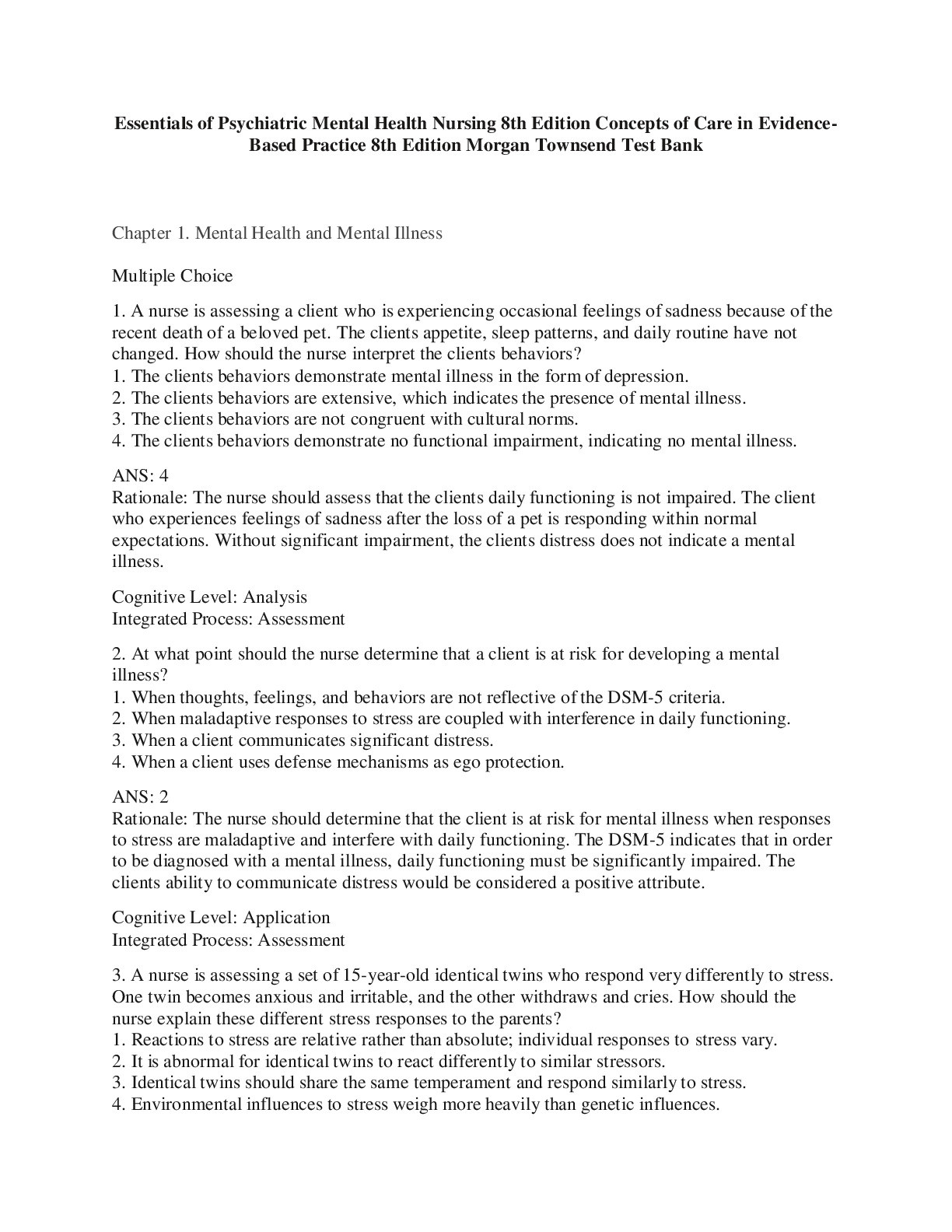1. A nurse is assessing a client who is experiencing occasional feelings of sadness because of the recent death of a beloved pet. The clients appetite, sleep patterns, and daily routine have not changed. How should the nurse interpret the clients behaviors?
1. The clients behaviors demonstrate mental illness in the form of depression.
2. The clients behaviors are extensive, which indicates the p
...[Show More]
1. A nurse is assessing a client who is experiencing occasional feelings of sadness because of the recent death of a beloved pet. The clients appetite, sleep patterns, and daily routine have not changed. How should the nurse interpret the clients behaviors?
1. The clients behaviors demonstrate mental illness in the form of depression.
2. The clients behaviors are extensive, which indicates the presence of mental illness.
3. The clients behaviors are not congruent with cultural norms.
4. The clients behaviors demonstrate no functional impairment, indicating no mental illness.
2. At what point should the nurse determine that a client is at risk for developing a mental illness?
1. When thoughts, feelings, and behaviors are not reflective of the DSM-5 criteria.
2. When maladaptive responses to stress are coupled with interference in daily functioning.
3. When a client communicates significant distress.
4. When a client uses defense mechanisms as ego protection.
3. A nurse is assessing a set of 15-year-old identical twins who respond very differently to stress. One twin becomes anxious and irritable, and the other withdraws and cries. How should the nurse explain these different stress responses to the parents?
1. Reactions to stress are relative rather than absolute; individual responses to stress vary.
2. It is abnormal for identical twins to react differently to similar stressors.
3. Identical twins should share the same temperament and respond similarly to stress.
4. Environmental influences to stress weigh more heavily than genetic influences.
4. Which client should the nurse anticipate to be most receptive to psychiatric treatment?
1. A Jewish, female social worker.
2. A Baptist, homeless male.
3. A Catholic, black male.
4. A Protestant, Swedish business executive.
5. A psychiatric nurse intern states, This clients use of defense mechanisms should be eliminated. Which is a correct evaluation of this nurses statement?
1. Defense mechanisms can be appropriate responses to stress and need not be eliminated.
2. Defense mechanisms are a maladaptive attempt of the ego to manage anxiety and should always be eliminated.
3. Defense mechanisms, used by individuals with weak ego integrity, should be discouraged and not eliminated.
4. Defense mechanisms cause disintegration of the ego and should be fostered and encouraged.
6. During an intake assessment, a nurse asks both physiological and psychosocial questions. The client angrily responds, Im here for my heart, not my head problems. Which is the nurses best response?
1. Its just a routine part of our assessment. All clients are asked these same questions.
2. Why are you concerned about these types of questions?
3. Psychological factors, like excessive stress, have been found to affect medical conditions.
4. We can skip these questions, if you like. It isnt imperative that we complete this section.
7. An employee uses the defense mechanism of displacement when the boss openly disagrees with suggestions. What behavior would be expected from this employee?
1. The employee assertively confronts the boss.
2. The employee leaves the staff meeting to work out in the gym.
3. The employee criticizes a coworker.
4. The employee takes the boss out to lunch.
8. A fourth-grade boy teases and makes jokes about a cute girl in his class. This behavior should be identified by a nurse as indicative of which defense mechanism?
1. Displacement
2. Projection
3. Reaction formation
4. Sublimation
[Show Less]
